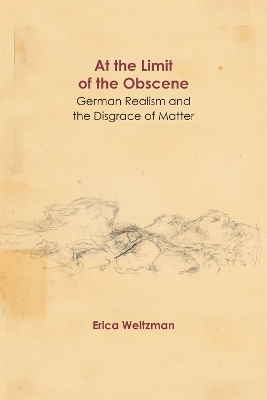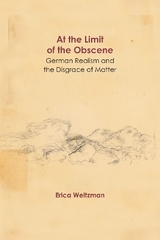At the Limit of the Obscene
German Realism and the Disgrace of Matter
Seiten
2021
Northwestern University Press (Verlag)
978-0-8101-4317-3 (ISBN)
Northwestern University Press (Verlag)
978-0-8101-4317-3 (ISBN)
Examines the fear of materiality in German-language realist and postrealist literature. The book argues that with German literature's turn in the mid-nineteenth century to the depiction of the profane, sensual world, anxiety emerged about the terms of that depiction.
At the Limit of the Obscene: German Realism and the Disgrace of Matter examines the fear of materiality in German-language realist and postrealist literature. The book argues that with German literature's turn in the mid-nineteenth century to the depiction of the profane, sensual world, anxiety emerged about the terms of that depiction-with consequences not only for the formal development of realist poetics but also for the conception of profane physical matter itself.Erica Weitzman analyzes works by Adalbert Stifter, Gustav Freytag, Theodor Fontane, Arno Holz, Gottfried Benn, and Franz Kafka to show how efforts to represent the material world in human terms led to an idea of the obscene as an excess of sensual appearance beyond human meaning: the very obverse of the anthropocentric worldview that realism both propagates and pushes to its crisis. At the Limit of the Obscene thus brings to light the troubled and troubling ontology underlying German realism, at the same time demonstrating how it shaped-and continues to shape-our ideas about materiality, alterity, perception, knowledge, representability, and the relationship of human beings to the nonhuman world.
At the Limit of the Obscene: German Realism and the Disgrace of Matter examines the fear of materiality in German-language realist and postrealist literature. The book argues that with German literature's turn in the mid-nineteenth century to the depiction of the profane, sensual world, anxiety emerged about the terms of that depiction-with consequences not only for the formal development of realist poetics but also for the conception of profane physical matter itself.Erica Weitzman analyzes works by Adalbert Stifter, Gustav Freytag, Theodor Fontane, Arno Holz, Gottfried Benn, and Franz Kafka to show how efforts to represent the material world in human terms led to an idea of the obscene as an excess of sensual appearance beyond human meaning: the very obverse of the anthropocentric worldview that realism both propagates and pushes to its crisis. At the Limit of the Obscene thus brings to light the troubled and troubling ontology underlying German realism, at the same time demonstrating how it shaped-and continues to shape-our ideas about materiality, alterity, perception, knowledge, representability, and the relationship of human beings to the nonhuman world.
Erica Weitzman is an assistant professor in the Department of German at Northwestern University. She is the author of Irony's Antics: Walser, Kafka, Roth and the German Comic Tradition, also published by Northwestern University Press.
Acknowledgments
Introduction: 'Scenes that do not belong in the light of day'
1. Against Nature: Adalbert Stifter
2. Base Matter: Gustav Freytag
3. Iconoclasm and Iconolatry: Theodor Fontane
4. Presence as Profanation: Arno Holz
5. Dead Ends: Gottfried Benn
6. Filth: Franz Kafka
Coda: "As if she were saying something shameless"
Notes
Bibliography
Index
| Erscheinungsdatum | 07.07.2021 |
|---|---|
| Zusatzinfo | 1 black & white image |
| Verlagsort | Evanston |
| Sprache | englisch |
| Maße | 152 x 229 mm |
| Gewicht | 633 g |
| Themenwelt | Geisteswissenschaften ► Sprach- / Literaturwissenschaft ► Anglistik / Amerikanistik |
| Geisteswissenschaften ► Sprach- / Literaturwissenschaft ► Literaturgeschichte | |
| Geisteswissenschaften ► Sprach- / Literaturwissenschaft ► Literaturwissenschaft | |
| ISBN-10 | 0-8101-4317-8 / 0810143178 |
| ISBN-13 | 978-0-8101-4317-3 / 9780810143173 |
| Zustand | Neuware |
| Haben Sie eine Frage zum Produkt? |
Mehr entdecken
aus dem Bereich
aus dem Bereich
Poetik eines sozialen Urteils
Buch | Hardcover (2023)
De Gruyter (Verlag)
59,95 €
Buch | Softcover (2024)
belleville (Verlag)
20,00 €




